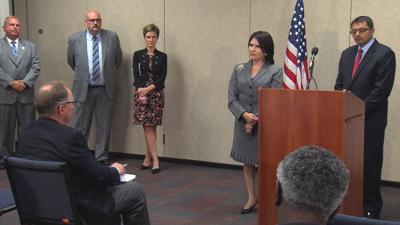SPRINGFIELD, Ill (WAND)- Opioid overdoses have taken the lives of nearly 11,000 Illinois residents since 2008.
Illinois officials are now trying to combat the growing epidemic in the state by launching the State of Illinois Opioid Action Plan.
"The opioid epidemic knows no neighborhood, no color, and no class. It is not confined to alleys in urban settings, nor isolated in rural communities. Illinois needs comprehensive opioid strategy that destigmatizes addiction and appropriately aligns resources across state agencies in partnership with community priorities." said Lt. Governor Evelyn Sanguinetti.
The numbers of deaths due to overdoses is rising in Illinois at an alarming rate. Since 2013, the number of deaths from heroin overdoses has nearly doubled, taking more than 1,000 lives in 2016. Last year saw 1,889 lives lost due to overdoes from prescription opioids, nearly quadrupling since 2013.
"If left unchecked the opioid crisis, we project, will claim the lives of nearly 3,000 people by 2020." Dr. Nirav D. Shah, Director of the Illinois Department of Public Health.
The goal of the plan is to reduce the amount of opioid related deaths by 33 percent in three years. The plan identifies three areas of focus: prevention, treatment and recovery, and response. Dr. Shah says prevention is key to keeping the number of deaths down.
"We are not going to arrest our way out of this crisis, or arguably even treat our way out of this crisis. Preventing the problem from taking hold in our communities is the surest way to make a dent in the numbers." he said.
To address the three areas of focus, the state laid out six priorities:
- Safer prescribing and dispensing of opioids
- Education and stigma reduction
- Data monitoring and communication
- Increasing access to care
- Supporting justice-involved populations
- Increasing naloxone access and use
Treating addiction as an illness and removing the stigma is important in helping to curb the number of deaths officials say.
"Changing the conversation about substance abuse disorder is essential so we effectively prevent and treat this disease." said Maria Bruni, Acting Assistant Secretary of Programs, Illinois Department of Human Services and Acting Director and Division of Alcohol and Substance Abuse.
Erasing the stigma is something that recovering addict Andrew Dewey can attest to as a helpful step.
"I am a guy who is well dressed, clean shaven, and I am the face of heroin. It's not what you think of. It's not just the homeless guy on the street corner, but it's also the daughter of a college professor, the nephew of an attorney, or the mom whose pain management with opioids turned ugly." he said.
The state will collaborate actively with other key stakeholders, including the Illinois Opioid Crisis Response Advisory Council, to build on the plan's framework.
In addition to the State of Illinois Opioid Action Plan, Governor Rauner signed an executive order that creates a task force dedicated to find ways to prevent and treat opioid addiction, and to promote recovery.











